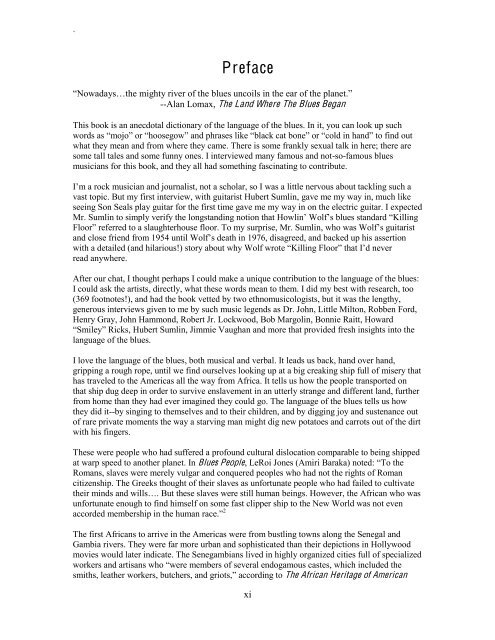Language of the Blues - Edmonton Blues Society
Language of the Blues - Edmonton Blues Society
Language of the Blues - Edmonton Blues Society
Create successful ePaper yourself
Turn your PDF publications into a flip-book with our unique Google optimized e-Paper software.
`<br />
Preface<br />
<br />
--Alan Lomax, The Land Where The <strong>Blues</strong> Began<br />
This book is an anecdotal dictionary <strong>of</strong> <strong>the</strong> language <strong>of</strong> <strong>the</strong> blues. In it, you can look up such<br />
words as <br />
what <strong>the</strong>y mean and from where <strong>the</strong>y came. There is some frankly sexual talk in here; <strong>the</strong>re are<br />
some tall tales and some funny ones. I interviewed many famous and not-so-famous blues<br />
musicians for this book, and <strong>the</strong>y all had something fascinating to contribute.<br />
<br />
vast topic. But my first interview, with guitarist Hubert Sumlin, gave me my way in, much like<br />
seeing Son Seals play guitar for <strong>the</strong> first time gave me my way in on <strong>the</strong> electric guitar. I expected<br />
<br />
<br />
<br />
<br />
<br />
read anywhere.<br />
After our chat, I thought perhaps I could make a unique contribution to <strong>the</strong> language <strong>of</strong> <strong>the</strong> blues:<br />
I could ask <strong>the</strong> artists, directly, what <strong>the</strong>se words mean to <strong>the</strong>m. I did my best with research, too<br />
(369 footnotes!), and had <strong>the</strong> book vetted by two ethnomusicologists, but it was <strong>the</strong> lengthy,<br />
generous interviews given to me by such music legends as Dr. John, Little Milton, Robben Ford,<br />
Henry Gray, John Hammond, Robert Jr. Lockwood, Bob Margolin, Bonnie Raitt, Howard<br />
<br />
n and more that provided fresh insights into <strong>the</strong><br />
language <strong>of</strong> <strong>the</strong> blues.<br />
I love <strong>the</strong> language <strong>of</strong> <strong>the</strong> blues, both musical and verbal. It leads us back, hand over hand,<br />
gripping a rough rope, until we find ourselves looking up at a big creaking ship full <strong>of</strong> misery that<br />
has traveled to <strong>the</strong> Americas all <strong>the</strong> way from Africa. It tells us how <strong>the</strong> people transported on<br />
that ship dug deep in order to survive enslavement in an utterly strange and different land, fur<strong>the</strong>r<br />
from home than <strong>the</strong>y had ever imagined <strong>the</strong>y could go. The language <strong>of</strong> <strong>the</strong> blues tells us how<br />
<strong>the</strong>y did it--by singing to <strong>the</strong>mselves and to <strong>the</strong>ir children, and by digging joy and sustenance out<br />
<strong>of</strong> rare private moments <strong>the</strong> way a starving man might dig new potatoes and carrots out <strong>of</strong> <strong>the</strong> dirt<br />
with his fingers.<br />
These were people who had suffered a pr<strong>of</strong>ound cultural dislocation comparable to being shipped<br />
at warp speed to ano<strong>the</strong>r planet. In <strong>Blues</strong> People<br />
Romans, slaves were merely vulgar and conquered peoples who had not <strong>the</strong> rights <strong>of</strong> Roman<br />
citizenship. The Greeks thought <strong>of</strong> <strong>the</strong>ir slaves as unfortunate people who had failed to cultivate<br />
<br />
unfortunate enough to find himself on some fast clipper ship to <strong>the</strong> New World was not even<br />
2<br />
<br />
The first Africans to arrive in <strong>the</strong> Americas were from bustling towns along <strong>the</strong> Senegal and<br />
Gambia rivers. They were far more urban and sophisticated than <strong>the</strong>ir depictions in Hollywood<br />
movies would later indicate. The Senegambians lived in highly organized cities full <strong>of</strong> specialized<br />
<br />
smiths, lea<strong>the</strong>r workers, butchers, and griot<br />
The African Heritage <strong>of</strong> American<br />
xi


